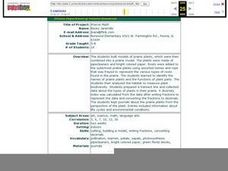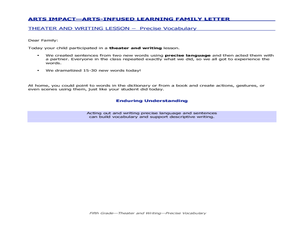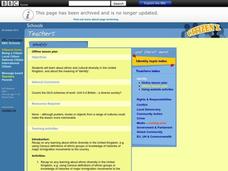Curated OER
Hop! Jump! Turn!
Students demonstrate action words, express meaning through mime, and demonstrate memory and aural comprehension skills. They view action words through pictures, and act them out.
Curated OER
Lights, Camera, Action!
First graders complete a variety of activities in which they practice recognizing verbs including a word guessing game. After a lecture/demo, 1st graders use worksheets imbedded in this plan to play the verb recognition game.
Curated OER
Vivid Verbs in Writing
Eighth graders explore how to incorporate vivid verbs in their writing. They review action verbs in sentences and view a Power Point presentation discussing possible verbs and their meanings. They view a website and retell a Greek myth...
Curated OER
Puzzling Verbs
Third graders complete a crossword puzzle. In this past tense words lesson, 3rd graders write past tense verbs and review what past tense means. Students review homophones and complete a worksheet where they complete a crossword puzzle...
Curated OER
Beginning Synonyms and Antonyms Multiple Choice- Verbs 6
In this synonyms and antonyms worksheet, students read 6 verbs and from 4 possible choices, select the best synonym. Students then find the best antonym for 6 words.
Curated OER
Idiom Conversations
In this idioms worksheet, learners choose the answer that is closest in meaning according to the preceding conversation. All of the sentences include different idioms and slang.
Macmillan Education
The Tell-Tale Heart
Rather than who done it, the mystery literary detectives have to solve as they examine the evidence found in Edgar Allan Poe's famous "The Tell-Tale Heart" is why did he do it?
Curated OER
Langston Hughes Was a Dreamer Too
Encourage your pupils to imagine their own dreams for the future. After studying three poems by Langston Hughes and listening to Dr. Martin Luther King, Jr.’s I Have a Dream speech, young poets craft their own dream stanza.
Ohio State University
Lesson Plan on China
Scholars ponder the beliefs of Confucianism. After reading several sayings made by Confucius, participants complete a chart filling in what each saying means using their own words. Using the same quotes split in half, pairs match...
Curated OER
Noisy Nora, Studious Students: Story Elements
Alliterative adjective nicknames generate stories inspired by Rosemary Wells' book Noisy Nora (also a thematic complement to any class with children who make a ruckus to get attention). Class members explore basic story elements --...
Curated OER
Prepositions
After reviewing the different purposes of prepostions and many examples, the class can practice using them in sentences. While little direction is provided in the plan, this is a fantastic resource for teachers looking for a simple...
Film English
Inseparable
Built around a moving short film about second chances and tough choices, this lesson mixes grammar, prediction, and narrative writing. Pupils practice with adjectives and prefixes before moving on to the film. The resource directs you to...
Curated OER
Borrowing Narrative Skills from Mr. Fletcher: Using a "Prompts in Reverse" Technique to Inspire Your Writers
Help your class find their writing voices with this instructional activity which uses the work of Ralph Fletcher to guide a "Prompt in Reverse" activity. Using the chapter "First Pen" from Fletcher's Marshfield Dreams, learners decipher...
Curated OER
Vocabulary
Fourth graders classify vocabulary words by category. Through matching and classification activities, 4th graders sort words pertaining to trees and forest habitats into appropriate categories. They discuss how vocabulary practice can...
Curated OER
Heroic Vocabulary: Using Decoding Strategies and Thesaurus
Develop the decoding skills of your middle and high schoolers. Scholars participate in a classroom activity that requires them to decode a word with a prefix and suffix. They apply the skill of breaking the word into parts of meaning as...
Curated OER
Prairie Math
Students work together to build models of prairie plants. Using the model, they estimate the height and then measure them using metric and standard units. They write a fraction to represent their part of the whole set and compare and...
Curated OER
Sonnet Explication
Learners analyze close readings of poems, looking up words in the dictionary, and discussing the major parts of dictionary definitions, including word origin and parts of speech. They examine sonnets, then compare/contrast their findings.
Curated OER
Proverbial Picture Pages
Examine the meaning of the word proverb, and then choose proverbs from a list. The list is not provided, but there are several resources listed here to find a variety of proverbs. Then have your learners explain the meaning of each...
Curated OER
Precise Vocabulary
Students complete acting exercises as a part of a precise language activity to help them build vocabulary and improve their descriptive writing skills. In this theatre and writing lesson, students create and act out a sentence with two...
Curated OER
Food and Dialect
The dialect words for types of food from across the British Isles get pupils thinking about native dialects and how they differ from Standard English. Class members create a dialect dictionary and discuss the difference between accent...
Curated OER
How Alike Are We?
Fourth graders find the range, mode, median, and mean for each of the data sets (height and shoe size). They discuss which measure of central tendency for each data set best represents the class and why. Students graph the shoe size and...
Curated OER
What's the Story?
Elvis Presley's music is the hook for this ESL lesson. Learners listen to an Elvis song, discuss the vocabulary words, and answer questions. This is a great way to have your class discuss new vocabulary.
Bright Hub Education
Jabberwocky - A Creative Writing Lesson Plan
Make some sense out of Lewis Carroll's famous nonsense poem "Jabberwocky." After reading through the poem, introduce the word portmanteau and send small groups off to alter the original poem.
BBC
Identity
Ethnic diversity is the focus of the political science lesson presented here. In it, pupils discuss the variety of ethnicities they see at their own school. They share their knowledge, or personal experiences of the way that people of...

























